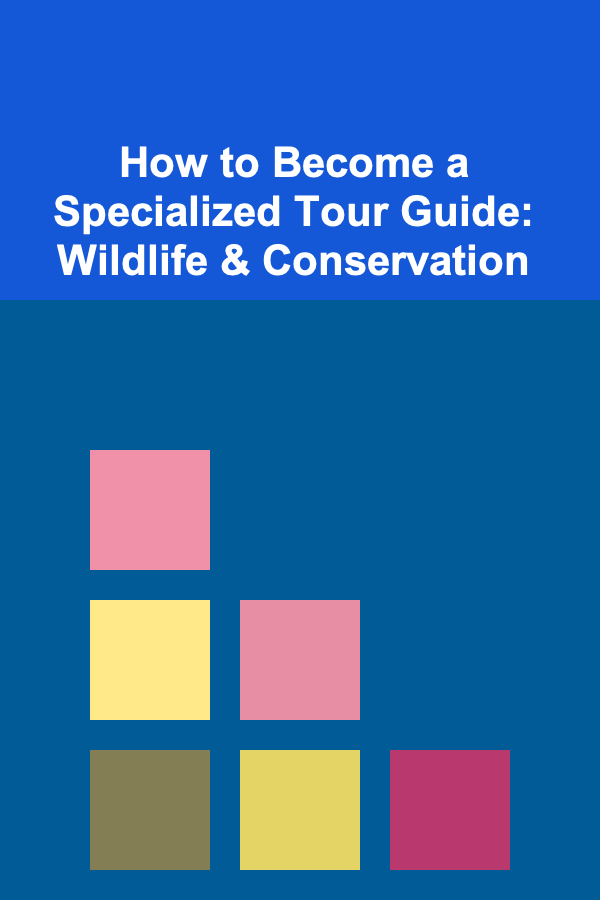
How to Become a Specialized Tour Guide: Wildlife & Conservation
ebook include PDF & Audio bundle (Micro Guide)
$12.99$11.99
Limited Time Offer! Order within the next:

Being a specialized wildlife and conservation tour guide is one of the most rewarding professions for those passionate about the natural world and committed to educating others about the importance of protecting our planet's biodiversity. Wildlife and conservation tour guides are responsible for leading individuals or groups through natural habitats, helping them observe animals, plants, and ecosystems, and educating them about the significance of conservation efforts. However, this career requires specialized knowledge, skills, and a deep love for nature.
In this article, we will explore the essential steps and skills required to become a wildlife and conservation tour guide, providing a comprehensive guide for aspiring professionals. From acquiring essential qualifications to developing expertise in specific areas of wildlife conservation, we will break down the journey step-by-step.
Understanding the Role of a Wildlife & Conservation Tour Guide
The role of a wildlife and conservation tour guide is both educational and experiential. Tour guides are responsible for leading guests on wildlife tours, helping them connect with nature, and imparting valuable knowledge about ecosystems, endangered species, and conservation efforts. The primary focus is on conservation, environmental education, and creating meaningful connections between people and wildlife.
Key responsibilities of a wildlife and conservation tour guide include:
- Guiding Tours: Leading groups or individuals on wildlife observation tours, whether in national parks, wildlife reserves, or other natural habitats.
- Educating Tourists: Explaining the behaviors, habitats, and conservation status of the animals and plants observed during the tour.
- Promoting Conservation: Encouraging sustainable practices, explaining the importance of conservation efforts, and raising awareness of the threats faced by wildlife and ecosystems.
- Ensuring Safety: Ensuring the safety of the tourists while maintaining minimal disturbance to wildlife.
The ideal tour guide in this field must be an effective communicator, passionate about wildlife conservation, and skilled in handling various challenges that arise when interacting with both wildlife and people.
Gaining Education and Qualifications
While a specific degree or certification may not be required to become a wildlife and conservation tour guide, formal education and training can significantly enhance your expertise and make you stand out in a competitive job market. Here are some key areas of education that can help you pursue a career in this field:
Environmental Science or Biology Degree
A degree in environmental science, biology, or a related field provides a strong foundation in understanding ecosystems, wildlife behavior, and conservation principles. You can specialize in subjects like wildlife biology, ecology, or conservation science to gain an in-depth understanding of the natural world.
- Wildlife Biology: A focus on the study of animals, their behaviors, habitats, and the ecological roles they play.
- Ecology: Studying the interactions between organisms and their environments, which is crucial when explaining how species depend on each other and their surroundings.
- Conservation Science: Focusing on the strategies and actions taken to protect ecosystems and biodiversity.
Certification Programs for Tour Guides
Though a degree is beneficial, completing a certification program specific to wildlife or conservation tourism can be incredibly valuable. Some well-known organizations offer specialized certifications, including:
- International Guide Academy (IGA): Offering certifications for various types of tour guides, including wildlife and conservation.
- National Association for Interpretation (NAI): NAI provides certification programs for interpreters, including wildlife specialists, to become qualified in environmental education and interpretation.
- Ecotourism Certifications: Many ecotourism certifications focus on sustainable practices in tourism. These programs often address topics like low-impact travel, wildlife protection, and ethical animal viewing.
Practical Experience with Wildlife and Conservation
Experience in the field is perhaps one of the most important elements of becoming an effective wildlife and conservation tour guide. Practical experience can be gained through internships, volunteer work, or employment with wildlife organizations, national parks, or conservation NGOs.
Volunteering and Internships
Volunteering with conservation organizations, national parks, or wildlife sanctuaries offers hands-on experience working with wildlife and conservation projects. Not only does this help you build knowledge about specific species, habitats, and conservation methods, but it also allows you to network with professionals in the field.
Internships with wildlife reserves or ecotourism companies can also provide valuable experience and help you develop practical skills in tour guiding, group management, and customer service.
Fieldwork in Wildlife Habitats
Spending time in the field, whether as a researcher or a field assistant, helps you develop a deeper understanding of the wildlife you will be discussing during your tours. Fieldwork enables you to observe animals in their natural habitats, understand their behaviors, and learn about conservation challenges firsthand. This experience enhances your credibility as a guide, as tourists are more likely to trust a guide who has real-world experience.
Developing Communication and Leadership Skills
A wildlife and conservation tour guide needs excellent communication and leadership skills. As a tour guide, you are responsible for engaging tourists, answering questions, and keeping their interest piqued during the tour. Communication skills are also vital in conveying complex scientific information in an accessible and engaging way.
Public Speaking and Storytelling
Effective storytelling is key to captivating your audience. Learning how to present information in a dynamic and engaging manner ensures that your tours are memorable and impactful. This skill helps guide discussions on the importance of conservation and environmental protection.
- Public Speaking: Take courses or attend workshops to improve your public speaking skills. The ability to speak confidently and effectively is essential for guiding groups.
- Storytelling: Use storytelling techniques to create an emotional connection with the tourists, helping them relate to the animals and ecosystems you are discussing.
Conflict Management and Group Leadership
Leading a group of tourists means dealing with different personalities, needs, and potential conflicts. A good tour guide is able to manage group dynamics, handle unexpected situations, and resolve conflicts calmly and professionally.
- Problem Solving: In the event of emergencies or unforeseen circumstances, being able to think quickly and make decisions in the best interest of the group and wildlife is crucial.
- Safety and Risk Management: Knowledge of safety protocols in wildlife environments is essential. Understanding how to handle medical emergencies, wildlife encounters, and other risks will help ensure the safety of your guests.
Specializing in Specific Areas of Wildlife or Conservation
While general wildlife and conservation knowledge is vital, specializing in a particular area can set you apart from other tour guides. Specializing allows you to focus on specific types of wildlife, ecosystems, or conservation challenges, and it can make you an expert in your field.
Focus on Specific Wildlife Species
One way to specialize is by focusing on a particular species or group of species. For example, you might choose to specialize in bird watching, big cats, or marine life. Specializing in a specific group of animals allows you to become an authority on that subject, making your tours more engaging and educational.
- Birdwatching Tours: Specializing in bird species can attract tourists who are specifically interested in bird watching. Birding tours often require knowledge of various species' behaviors, migration patterns, and conservation statuses.
- Big Cats or Apex Predators: Specializing in apex predators such as lions, tigers, or wolves requires extensive knowledge about their behaviors, conservation threats, and their role in the ecosystem.
Eco-Conservation and Sustainability
Another area of specialization is in eco-conservation and sustainable tourism practices. As environmental awareness grows, many tourists seek out sustainable travel experiences that minimize their ecological footprint.
- Sustainable Tourism Practices: Understanding how to run eco-friendly tours that benefit both tourists and the environment is crucial. Tour guides specializing in sustainable tourism help ensure that their tours contribute positively to wildlife and ecosystems.
- Conservation Efforts: Specializing in conservation projects, such as anti-poaching initiatives or wildlife restoration efforts, will allow you to bring awareness to important conservation campaigns while educating your tourists.
Building a Reputation and Networking
Building a reputation as a reliable and knowledgeable wildlife and conservation tour guide is crucial to your success in the field. Networking with other professionals, joining industry organizations, and using social media can help you build a strong presence and attract tourists.
Networking with Professionals
Networking with other guides, wildlife organizations, national park managers, and conservationists can help you stay informed about developments in the field and open up opportunities for collaboration. Many guides also form partnerships with other tour operators, creating unique and comprehensive wildlife experiences for tourists.
Social Media and Online Presence
In today's digital age, having an online presence is a great way to promote your services. Whether you create a website, maintain a blog, or share photos and videos on social media, these platforms allow you to showcase your expertise, attract clients, and build a following of nature lovers and conservation advocates.
Understanding Ethical Practices in Wildlife Tourism
As a wildlife and conservation tour guide, it is essential to follow ethical guidelines to protect wildlife, promote responsible tourism, and minimize the environmental impact of your tours. This involves ensuring that tourists adhere to respectful practices when interacting with wildlife and educating them on the importance of minimizing disturbances.
Minimizing Impact on Wildlife
- Respecting Wildlife: Always ensure that your tours respect the natural behaviors and habitats of wildlife. Do not encourage tourists to get too close to animals or engage in disruptive activities.
- Promoting Responsible Practices: Teach your guests about the importance of respecting wildlife and preserving natural habitats, such as not feeding animals, keeping noise to a minimum, and following established trails.
Supporting Conservation Efforts
A responsible wildlife tour guide actively supports conservation initiatives. You may choose to work with organizations that donate a portion of profits to conservation efforts, or you can incorporate educational materials on local conservation challenges into your tours.
Continuous Learning and Professional Development
Finally, becoming an expert in wildlife and conservation tourism requires ongoing learning and professional development. This includes keeping up to date with new research, trends in conservation, and changes in wildlife management practices. As a tour guide, your role as an educator never stops, and lifelong learning is essential.
Attending Conferences and Workshops
Participating in conservation conferences, workshops, and training programs can keep you informed about the latest developments in wildlife conservation, ecological management, and sustainable tourism.
Further Education and Specialization
Consider pursuing advanced studies or certifications in areas like environmental ethics, wildlife photography, or eco-tourism management. Continuing education will ensure that your knowledge stays current and that you remain an effective and informed guide.
In conclusion, becoming a specialized wildlife and conservation tour guide requires a combination of education, practical experience, communication skills, and a passion for nature conservation. By following the steps outlined in this guide, you can embark on a rewarding career that allows you to connect people with nature while promoting sustainable practices and wildlife preservation. Through continuous learning, ethical practices, and specialized knowledge, you can make a meaningful impact on the conservation movement and inspire others to protect the natural world.
Reading More From Our Other Websites
- [Organization Tip 101] How to Make Recurring Donations Easy and Affordable
- [Home Space Saving 101] How to Create Functional Basement Storage Solutions
- [Organization Tip 101] How to Organize Kitchen Spaces for Showings
- [Toy Making Tip 101] Crafting Creativity: How DIY Toy Making Boosts Problem-Solving Skills
- [Home Security 101] How to Evaluate the Cost of Home Security Systems
- [Paragliding Tip 101] Breaking Barriers: Inside the World's Fastest Paragliders
- [Personal Finance Management 101] How to Build Wealth through Smart Financial Choices
- [Home Holiday Decoration 101] How to Design Unique Holiday Centerpiece Ideas for Your Home
- [Home Rental Property 101] How to Deal with Problem Tenants in a Professional Manner
- [Home Party Planning 101] How to Host a Themed Potluck Dinner Party at Home

How to Clean Your Dishwasher for Better Performance
Read More
How to Create the Ultimate Grocery Shopping Checklist
Read More
How to Organize Your Home Office for Remote Work Success
Read More
How to Set Up a Checklist for Managing Your Vacation Photos and Memories
Read More
The Ultimate Guide to Creating a Mobile App
Read More
How to Teach Teenagers About Credit Cards
Read MoreOther Products

How to Clean Your Dishwasher for Better Performance
Read More
How to Create the Ultimate Grocery Shopping Checklist
Read More
How to Organize Your Home Office for Remote Work Success
Read More
How to Set Up a Checklist for Managing Your Vacation Photos and Memories
Read More
The Ultimate Guide to Creating a Mobile App
Read More